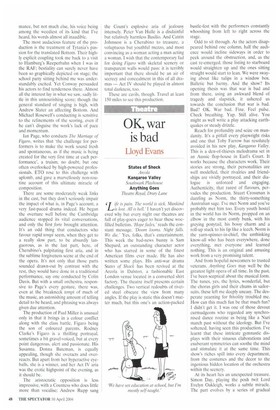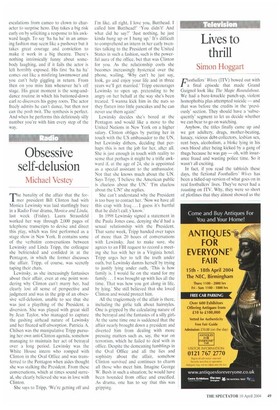OK, war is bad
Lloyd Evans
States of Shock Arcola Kangaroo Valley Southwark Playhouse Anything Goes Theatre Royal, Dnny Lane
c ife is pain. The world is sick. Mankind „
I is lost. All is hell.' I haven't yet discovered why but every night our theatres are full of play-goers eager to hear these woefilled bulletins. 'Hope fades,' reads the constant message. 'Doom looms. Night falls. We die.' Yes, folks, that's entertainment. This week the bad-news bunny is Sam Shepard, an outstanding character actor who has starred in some of the finest American films ever made. He has also written some plays. His anti-war drama States of Shock has been revived at the Arcola in Dalston, a fashionable East London venue located in a converted shirt factory. The theatre itself presents certain challenges. Two vertical redoubts of riveted steel obscure the view from many' angles. If the play is static this doesn't matter much, but this one's an action-packed
bustle-fest with the performers constantly whooshing from left to right across the stage.
Odd to sit through. As the actors disappeared behind one column, half the audience would incline sideways in order to peek around the obstruction, and, as the cast re-emerged, those listing to starboard would straighten up and the ones sitting straight would start to lean. We were swaying about like tulips in a window box. Balletic but barmy. And the show? Its opening thesis was that war is bad and from there, using an awkward blend of tragedy and slapstick, it ushered us towards the conclusion that war is bad. Bad? OK. War bad. Fine. Feel pulse. Check breathing. Yup. Still alive. You might as well write a play attacking earthquakes or steady drizzle.
Reach for profundity and seize on mundanity. It's a pitfall every playwright risks and one that Toby Farrow has resolutely avoided in his new play, Kangaroo Valley. This is a den-of-thieves melodrama set in an Aussie flop-house in Earl's Court, It works because the characters work. Their stories are strong, their personalities are well modelled, their rivalries and friendships are vividly portrayed, and their dialogue is unforced and engaging. Authenticity, that rarest of flavours, pervades the production. Stuart Crossman is dazzling as Norm, the thirty-something Australian sage. I've met Norm and you've probably met him too. Every youth hostel in the world has its Norm, propped on an elbow in the most comfy bunk, with his greying ponytail, his bossy charm and a roll-up stuck to his lip like a leech. Norm is the yarn-spinner-in-chief, the unthinking know-all who has been everywhere, done everything, met everyone and learned nothing. This is an original and amusing work from a very promising talent.
And from hopeful newcomers to trusted veterans. Anything Goes may well be the greatest light opera of all time. In the past, I've been sceptical about the musical form. The tunes, yes, the lyrics, wonderful, but the chorus girls and their chums in sailorsuits, these left me deeply uneasy. The desperate yearning for frivolity troubled me. How can this much fun be that much fun? I didn't get it. I was one of those devout curmudgeons who regarded any synchronised dance routine as being like a Nazi march past without the ideology. But I've softened, having seen this production. I've learnt that these intricate gymnastic displays with their sinuous elaborations and exuberant symmetries can soothe the mind and stimulate it at the same time. This show's riches spill into every department, from the costumes and the decor to the ingenious hidden location of the orchestra within the scenery.
At its heart lies an unexpected treasure. Simon Day, playing the posh twit Lord Evelyn Oakleigh, works a subtle miracle. The part evolves by a series of gradual escalations from cameo to clown to character to surprise hero. Day takes a big risk early on by soliciting a response to his awkward laugh. To say 'ha ha ha' in an amusing fashion may seem like a pushover but it takes great courage and conviction to make it work in a big theatre. There's nothing intrinsically funny about somebody laughing, and if it fails the actor is left horribly exposed. His first 'ha ha ha' comes out like a misfiring lawnmower and you can't help giggling in return. From then on you miss him whenever he's off stage. His great moment is the song-anddance routine in which his buttoned-down earl re-discovers his gypsy roots. The actor freely admits he can't dance, but then nor can the posh twit. The synthesis is perfect. And when he performs this deliriously silly number you're with him every step of the way.



































































 Previous page
Previous page